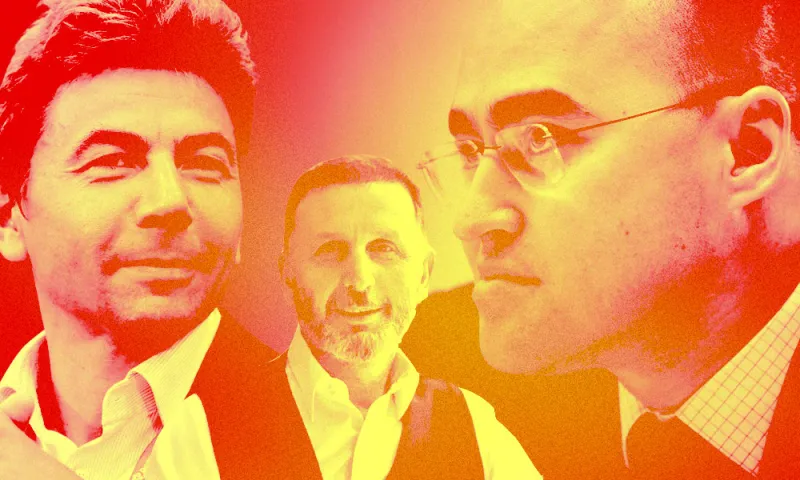It’s been a tough year for executives across Europe, the Middle East, and Asia — especially for those in the healthcare sector.
“To be completely honest, throughout the past six months most decisions have been exceptionally challenging,” said Dr. Ahmed Ezzeldin Mahmoud Abdelaal, chief executive of Cleopatra Hospitals Group, which operates six hospitals in the Cairo area in Egypt. In May, Dr. Ezzeldin was at the helm when the group converted two of its facilities into Covid-19 treatment and isolation centers.
“The transition had to take place in a very short time frame and there was no room for error,” said Dr. Ezzeldin, who has been voted the No. 2 healthcare CEO in Institutional Investor’s 2020 Emerging EMEA Executive Team.
First place in the healthcare sector went to MLP Care chief executive Muharrem Usta, who leads Turkey’s largest healthcare provider. Usta said the safety of his staff was a top priority at MLP, which has 30 hospitals in 16 Turkish cities and has been involved in the treatment and diagnosis of patients with Covid-19, as well as public health messaging.
Both chief executives say the coronavirus has accelerated their companies’ digital transformations. Under the leadership of Dr. Ezzeldin, Cleopatra Hospitals has introduced new technologies to enhance back office and patient services. Patients can now take part in digital consultations using a proprietary app, as well as book home visits and diagnostic services – all without stepping foot in a clinic.
The digital transformation was already well underway in MLP hospitals when coronavirus hit, according to Usta. But the pandemic has expedited the testing of new services, especially remote access for patients who cannot go out due to lockdown. Now, MLP is looking forward to a new era of artificial intelligence in healthcare and aiming to launch a new AI center that, Usta said, will “take our clinical skills to a higher level.”
[II Deep Dive: These C-Suites Stayed Strong in 2020]
It’s not just healthcare companies that have accelerated their transitions to digital services during the pandemic. Igor Shekhterman was this year’s top scoring chief executive in the consumer category as CEO of X5. Under his watch, X5, a leading Russian food retailer, used new digital processes to cope with consumer demand and changes in behavior.
“This year has been all about tough decisions,” Shekhterman said. “I think [the one] that will leave the greatest mark on our business will be commit[ing] significant resources to rapidly expanding online and other innovative businesses that had been developing on a much more conservative timeframe.”
Alexey Kornya, II’s top scoring media, technology, and telecommunications CEO, said his company Mobile Telesystems Russia has doubled down on longer-term initiatives to boost efficiency in-house.
“In business, as in other areas of life, the toughest decisions always concern people,” he said. Kornya was juggling moving large numbers of personnel to remote working at the same time as network loads surged in residential areas due to people staying home.
“Our customers were increasingly relying on us to keep them informed, employed, and in touch with friends and family,” Kornya said. “So it was absolutely critical that we provide robust, reliable connectivity.”
Shekhterman expects the challenges of this year to continue into 2021. Chief executives across healthcare, retail, telecommunications and other industries must straddle the digital divide, making sure offline services are safe and efficient, while grasping the extent to which changes to customer behavior are permanent, he argued.
“The companies that get it right will be the big winners in 2021 and beyond,” Shekhterman said.
Igor Shekhterman
X5 Retail Group
ConsumerWhat has been the greatest challenge for your sector this year?
As the pandemic spread in Russia, we had to urgently take measures to keep our employees and customers safe, while at the same time responding to an unprecedented spike in demand and changes in consumer behavior. Thanks to X5’s robust business processes and the strategic digital transformation that was already underway, we were not only able to maintain smooth operations and keep store shelves stocked when demand peaked ahead of the lockdown in Russia – we have also massively expanded our digital business, with online revenue increasing by 311 percent year-on-year in 1H 2020. In addition to scaling up our existing online supermarket business, we also rolled out new express delivery services that offer customers delivery to their door from local stores.
What was the toughest decision you made in 2020?
We had already been implementing major changes behind the scenes to lead the gradual shift in food retail towards online and other new formats. Fortunately, this meant that we had the IT infrastructure, the in-house know-how, and the business processes in place to accelerate development and roll-out of some of these new services and technologies. It was tough to commit to changing our plans so significantly, but we are an agile business despite our size, and I think that it has paid off.
How is your company innovating?
We are using our own big data solutions, for example, to manage assortment and pricing in our stores. We have developed both the hardware and software for the cashierless checkouts we are installing in stores. Our courier-based express delivery system leverages the X5 technology platform to enable customers to order goods from a local store and have them delivered to their door within an hour. But we see opportunities to significantly expand the reach of our business by innovating further and doing more to help our customers throughout their journey to buy food, from planning to purchasing to consumption.
What is the greatest challenge that lies ahead for 2021?
Without a doubt the greatest challenges will be responding to the economic and behavioral changes that will result from the Covid-19 pandemic in 2021. In this context, the challenge will be to make sure our offline stores are operating safely and efficiently, while understanding what changes in customer behavior will be sustained beyond the end of the pandemic and which ones will be short-lived. The companies that get it right will be the big winners in 2021 and beyond.
What opportunities do you see for 2021?
X5 has gained new customers throughout 2020, thanks to changes in customer behavior and our ability to adapt quickly to offer customers safe ways to buy their food in the context of the Covid-19 pandemic. We have also emerged as the leader in online food retail in Russia thanks to our expansion of existing businesses and the fast roll-out of new offerings. Our opportunity in 2021 is to make the right strategic adjustments to keep these new customers while continuing to serve our existing audience, and to further expand our use of online and innovative technologies to enhance the way we interact with our customers.
Dr. Ahmed Ezzeldin Mahmoud Abdelaal
Cleopatra Hospitals Group
Health Care & PharmaceuticalsWhat has been the greatest challenge for your sector this year?
The outbreak of Covid-19 and the consequent shock to the global economy have posed and will continue to pose significant operational challenges for the group, but they have also opened up significant opportunities for future growth in segments of the healthcare market currently under-penetrated in Egypt. Our challenge in the past six months and in the coming year has been and will be to seize these opportunities and ensure we continue to lead the Egyptian healthcare industry.
What was the toughest decision you made in 2020?
To be completely honest, throughout the past six months most decisions have been exceptionally challenging. However, the one that stands out to me for being both the most difficult and at the same time the most rewarding was our decision back in May to convert two facilities into Covid-19 treatment and isolation centers. The transition had to take place in a very short time frame and there was no room for error. Within just three weeks both facilities were fully up and running. Since then, we have treated over 300 Covid-19 suspected or positive patients, helping to relieve pressure for the government-run facilities.
Have there been any unexpected opportunities for your business this year?
While the Covid-19 pandemic has been tragic and has impacted all of us both personally and professionally, it has also opened up important future growth opportunities for CHG. In light of the changing market dynamics, we have introduced multiple new digital and home visit services to facilitate access to our medical services for patients unable or unwilling to visit our facilities in person during the crisis.
How is your company innovating?
The group sees digitalization as a key driver of future growth. In today’s increasingly digital society, digitalization is playing a consistently larger role in allowing companies to remain a step ahead of their competition, and the healthcare industry is no exception. In recent months, we have greatly expanded our digital service offering, adding new features to our CHG App which allow our patients to conduct video consultations and follow ups and book home visits and diagnostic services directly from their phones. In the coming year, we will be further expanding our offering to ensure we continue to lead the industry on the digitalization front.
What is the greatest challenge that lies ahead for 2021?
Since inception, our growth strategy has focused on growing our hospital’s platform through strategic acquisitions and expansions. While this has seen us achieve exceptional results, in 2021 we will be shifting our focus towards driving growth across the group’s other various revenue streams to capitalize on the potential offered by our diagnostics, polyclinics, and pharmacy platforms.
What opportunities do you see for 2021?
The biggest opportunities in 2021 will come on the back of a recovering Egyptian economy as the impacts of the pandemic subside. With the Egyptian government’s increased support for the healthcare sector, we are optimistic about what is to come in the new year.
Muharrem Usta
MLP Care
Health Care & PharmaceuticalsWhat has been the greatest challenge for your sector this year?
There is no doubt that the greatest challenge of 2020 for our industry and even for the world was the Covid-19 pandemic. This new type of virus, which is very contagious and has high mortality rates, has dramatically altered the lives of people and institutions. Our industry has taken a defensive crisis management position in order to combat the uncertainty of the virus and its destructive impacts. In order to combat the pandemic, on the one hand, we took part in the diagnosis and treatment processes of Covid-19 patients; on the other hand, we worked hard to reduce the spread of the virus through informing the public correctly under the leadership of our senior physicians.
What was the toughest decision you made in 2020?
At MLP Care, we can deal with every setback well and take appropriate actions through our “Agile Hospital Management” philosophy. This characteristic feature enabled us to adapt to the new situation that emerged with the pandemic in a short time. However, as you know, pandemic periods are very risky for healthcare professionals… We have devoted more time to this issue than ever before by closely following the working conditions of our physicians and nurses in order to fulfill our responsibilities, especially in terms of sustainability of service and public health.
Have there been any unexpected opportunities for your business this year?
We have been investing aggressively in digital transformation for the last two years. The Covid-19 pandemic allowed us to test some of the alternative service channels that we were planning to implement in the near future. In recent months, we have served people who cannot or do not want to come to hospitals due to movement restrictions, especially patients with chronic diseases, with virtual doctor interviews.
How is your company innovating?
[As well as] digital transformation, [we] are also very excited about the projects in the field of clinical artificial intelligence, both within our organization and with our collaborations. One of our goals is to launch an Artificial Intelligence Center of Excellence that will enable us to take our clinical skills to a higher level.
What is the greatest challenge that lies ahead for 2021?
There has been pressure on foreign currency exchange rates since 2018... We cannot ignore the possible disadvantages of the macroeconomic headwinds, which felt more due to the pandemic, for the companies with foreign currency debt like ourselves.
What opportunities do you see for 2021?
The number of people with top-up insurance increased by 499,000 in the last 12 months. Based on these figures, more people preferred to have health insurance during the pandemic period, and therefore we anticipate that this interest will contribute to the growth of this revenue segment in the upcoming periods. Also, we expect that our foreign medical tourism revenues will regain its strong growth in 2021. The number of private hospitals in Turkey is 577. Currently, only 67 of them are operated by relatively large private hospital groups. We anticipate that the number of M&A transactions in the healthcare sector [will] increase driven by the pandemic. There will be lucrative consolidation opportunities for our company going forward.
Pavel Grachev
Polyus
Metals & MiningWhat has been the greatest challenge for your sector this year?
With the spread of Covid-19, I firmly believe that the single greatest challenge this year, affecting not just the mining sector but all industries, has been in keeping our people safe and protecting our local communities. The remote location of many mining operations, including our own assets, in addition to the shift nature of our work, has presented numerous tough challenges in reacting to the pandemic. Making swift decisions and taking all necessary measures has been a tough challenge globally.
Have there been any unexpected opportunities for your business this year?
We have always taken a prudent financial approach, and our goal is to optimize our production costs whilst modeling our business conservatively. Therefore, considering the weakened U.S. dollar amidst the pandemic, negative inflation-adjusted bond yields and geopolitical tensions, gold has enjoyed its longest winning streak this year, which we have naturally benefited from at a scale we could not have predicted.
How is your company innovating?
Polyus actively promotes a culture of innovation within our organization for two main reasons – to improve efficiency, and to maintain our high safety standards. We have been rolling out remote-control systems for our operations for several years, and are now using drones for 3D mapping of our operations. These drones enable us to access those areas of our mines that are hardest-to-reach, and we use the mapping data to create digital twins of our deposits.
What is the greatest challenge that lies ahead for 2021?
In 2021, we expect to present the results of the feasibility study for Sukhoi Log, one of the world’s largest greenfield deposits, and subsequently come up with the final investment decision for the asset. There are many challenging factors that must be considered in the development of a project as large as Sukhoi Log — timing and scheduling its execution properly is just one crucial element, taking into account the project’s complexity and its capital-intensive requirements. Hence, managing the potential development of this project could be the most-coveted challenge of a mining professional’s lifetime.
Alexey Kornya
Mobile TeleSystems
Technology, Media & TelecommunicationsWhat has been the greatest challenge for your sector this year?
Like most companies, we faced significant challenges in ensuring business continuity as we transitioned most of our employees to remote work. However, unlike many industries, we also had to simultaneously cope with sharply higher demand. Network loads were surging and traffic flows were shifting to residential areas. Our customers were increasingly relying on us to keep them informed, employed, and in touch with friends and family. At the same time, MTS is more than just a connectivity provider. We operate in other industries — like banking, retail, and media — some of which were substantially impacted by the pandemic. We took a targeted approach to address the specific challenges in each segment. In financial services — where we saw the largest impact — we kept a sharp eye on portfolio risk while making hard decisions about employee headcount and compensation. In retail, we equipped employees with personal protection equipment and began screening walk-in customers to our stores. In media, we pivoted our offerings, launching live immersive VR concerts with some of Russia’s leading performing artists.
What was the toughest decision you made in 2020?
In business, as in other areas of life, the toughest decisions always concern people. In 2020, we were faced with stark choices about where, how, and with whom we should work. MTS was one of the first large Russian companies to begin shifting employees to remote work. While we were juggling all of this, we also realized that the current environment would further accelerate digitalization and sharpen the focus on productivity. So we doubled down on our longer-term initiatives to boost efficiency — from automating workflows to streamlining decision making and optimizing our organizational structure.
Have there been any unexpected opportunities for your business this year?
In our core business, the growth outlook has been limited. We understood that the crisis gave us a rare opportunity to demonstrate our commitment to our customers beyond a simple financial relationship. For example, we provided free access to official health resources, launched a free mental wellness hotline, extended connectivity services on credit, and provided free connectivity for healthcare workers. It’s often said that “hard times reveal true friends.” We wanted our customers to know that we would stand by them when it really mattered. In some sense, this was the biggest business opportunity of 2020.
What is the greatest challenge that lies ahead for 2021?
At MTS, we continue to move at pace on our longer-term transformation — shifting from a single- to a multi-product business model built around a digital ecosystem of world-class products and services.
What opportunities do you see for 2021?
To me as a CEO, I find it important to never lose sight of the big picture. Despite short-term uncertainty, my long-term outlook remains bright. Connectivity is more essential than ever, and digital transformation is accelerating like never before. Everywhere you look innovation is spreading — from contactless payments to video streaming, telemedicine, home-based fitness, and cloud-based workflows. What was once bleeding edge is now mainstream. And I’m confident that those who stand ready to embrace that future will be best positioned to capture the tailwinds in the years ahead.







